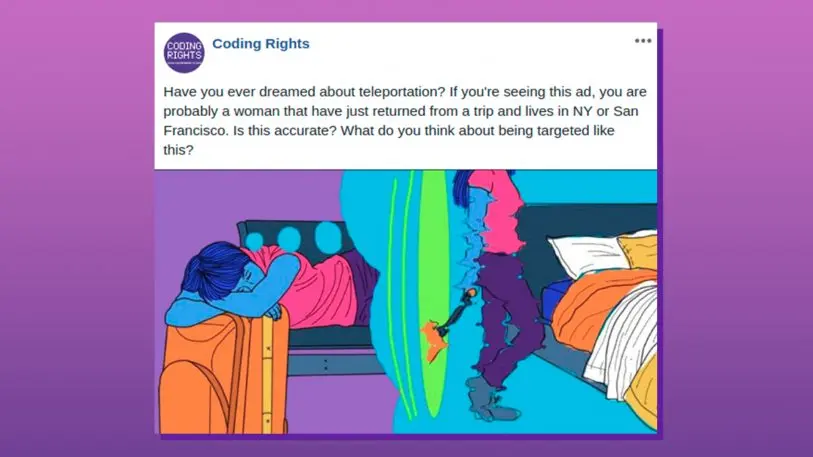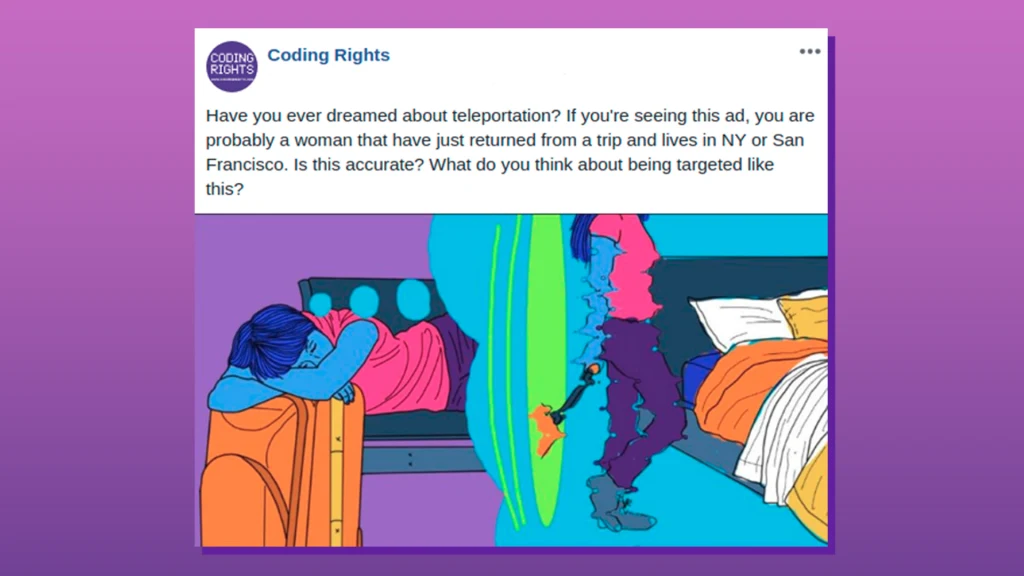When she was in college, data researcher and Mozilla Foundation fellow Rebecca Ricks began getting Facebook ads related to pregnancy–even though she hadn’t clicked on anything that would indicate interest in having a baby. Was it because she was a young woman? Was it because classmates of hers were getting married? Or had Facebook somehow decided that she was at the right age to get pregnant?
Ricks still doesn’t know exactly why Facebook was targeting her–but it sparked her curiosity about what generalizations Facebook allows advertisers to make based on things like gender identity, race, or sexuality. Facebook has been under fire for years for letting advertisers discriminate against legally protected groups such as African Americans and elderly people through advertising for housing and jobs, as ProPublica has reported again and again. But as Ricks experienced, targeting can also impact users in more subtle ways. And though the social media platform does offer the ability to control how companies target you, those settings are difficult to find and time-consuming to manually clear out.
That’s why Ricks teamed up with two other fellows at the Mozilla Foundation, Joana Varon and Hang Do Thi Duc, to create an easy way for people to clean out their ad preferences and prevent targeting from happening in the first place. Their Firefox and Chrome extension, called Fuzzify, streamlines and simplifies the process down to a few clicks–and then reminds you to keep cleaning your ad preferences out every week.
Joana Varon, who directs the technology and human rights-focused group Coding Rights, has experimented widely with how Facebook targets users with ads. In a recent research paper, she highlighted the implications of ad targeting for women and nonbinary people when they are subjected to stereotypes around gender through a series of tests on Facebook’s ad platform.
In one experiment, Varon bought highly targeted Facebook ads, and then revealed what the targeting categories were to the people who saw it. For instance, one ad announced that it was targeting women who were interested in teleportation and had just returned from a trip; another directly targeted women in long-distance relationships who were interested in motorcycles. Based on the reactions to the posts, the targeting was incredibly accurate–and creepy.
These might be light examples, but Ricks has separately conducted interviews with women who’ve had more unsettling interactions with Facebook ads. One person received targeted ads asking her to “sell your Asian eggs,” while others received baby-related ads when they were struggling with infertility. “Those are moments when there’s nothing overtly discriminatory happening, but it’s one moment where advertisers are using sensitive information to target you and it’s having real harm,” Ricks says. “We don’t have the tools or policies to talk about it.”

That’s where the trio hope Fuzzify can help. Part of the extension sits right on top of Facebook’s privacy controls, including an entire section dedicated to advertisers that have uploaded contact lists of customers to the ad platform so they can reach those people on Facebook. As well as letting you easily delete this information, the extension also includes a page that gathers all the ads you see and lists out the reasons why Facebook served them to you.
“By building this browser on top of existing transparency tools, we’re really relying on Facebook being honest about what it’s collecting and what it’s not collecting,” Ricks says. “We wanted to expand beyond a privacy tool and use it as a tool for research and accountability. You can run your own experiment to see how effective Facebook’s transparency tools actually are.”
Duc also focuses on privacy in her other work. Her project Data Selfie mimicked the way Facebook tracks you so you could get a sense of the kind of psychological profile the company has created based on your clicks, likes, and shares. Most recently, she created a data visualization of all the public data on Venmo, similarly urging users to be more proactive about managing their privacy settings.
From her personal habit of clearing out her Facebook ad preferences every week, Ricks has noticed that there’s a group of companies that upload their information about her to Facebook’s ad platform again and again, no matter how many times she deletes it. And when she does clear out the categories Facebook targets her by, she finds that instead of getting random ads, she mostly just gets ads based on what her friends like.
Ricks finds this kind of knowledge empowering. “There’s an inherent power asymmetry on a platform like Facebook. Users have all this data collected about them, but no insight into how it’s being used,” she says. “You as a Facebook user taking action to [deny] advertisers access to information is a political move.”
You can download Fuzzify here.
Recognize your brand’s excellence by applying to this year’s Brands That Matter Awards before the early-rate deadline, May 3.






